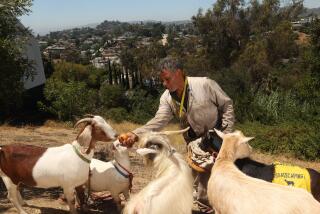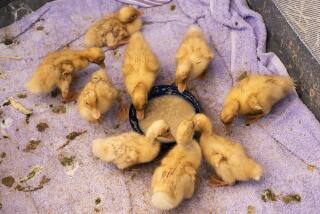Neighbors Squawk Over Flock
- Share via
Anna Scheybeler sometimes sets her alarm for every two hours in the middle of the night to feed her “babies.” They’re tiny, fragile and still growing their feathers.
They can be demanding too, seven baby macaws that will softly twitter when they want a bottle feeding. They are among more than 60 exotic birds--including cockatoos and Amazon parrots--Scheybeler raises at her El Monte home, keeping them in the garage, a bedroom and an aviary bigger than her living room.
But the flock has ruffled some feathers.
Residents complained to the city Planning Commission, saying the birds’ constant chirping, singing and sometimes squawking keeps them from concentrating during the day and sleeping at night. The commission found Scheybeler in violation of the city code because her aviary is too large and her birds too close to neighbors’ houses.
She and the neighbors have been at odds over the birds for more than a year, and Scheybeler has been asking the city to waive the restrictions on the aviary and allow her to keep her birds in different parts of her house. At various public hearings she has said she survived a recent heart attack and overcame cancer because she was meant to take care of her flock.
“I was sent home to die from my heart attack, and when I saw my birds I got rid of my disease,” she told commissioners in October. The birds, she said, weren’t nearly as loud as neighbors alleged.
The commission denied her request. She must keep her birds at least 35 feet away from her neighbors and remove the aviary, a wood and wire structure of about 720 square feet in the backyard. Scheybeler is appealing to the City Council, which is scheduled to consider her case Nov. 20.
The commission’s order addressed the aviary, but some neighbors also complain that Scheybeler is illegally running a business out of her home.
“I need the money too,” said Ann Russell, a neighbor. “I only have $100 left after I pay my bills. I could be selling birds too, but I don’t do business.”
Scheybeler, 64, concedes that she and her business partner have sold birds since 1980 and that she has raised them for the last four years at her home. But to Scheybeler, the birds aren’t just a business.
Feeding Baby Macaws With a Bottle
Her world revolves around the creatures. By 7 a.m., after her morning tea, she has started nourishing her baby macaws with a bottle. Then she feeds her other macaws in the garage. Some days it’s fruit, some days seeds. As she prepares the food, her hands tremble and she walks slowly, the lingering effects from her heart attack.
Many of her birds are also recovering from various illnesses. A 1-year-old African gray parrot named Friday was once paralyzed from the waist down. She adopted him when he was a baby and massaged his legs until he was able to move again. He is one of her favorites.
“Hi, baby,” she said to him one recent morning before opening the cage. “Say, ‘I love you.’ ”
“I love you,” he blurted in a high voice.
Scheybeler leaned toward the entrance of the cage as Friday approached her face.
“Give me the pretty, pretty kisses,” she said, closing her eyes. Friday lowered his head, seeking out Scheybeler’s lips. She smiled as he played with her scant, white hair, a result of two years of chemotherapy combating lymphoma.
She moved on to other cages in the garage, feeding and cleaning. She then did the same in the aviary, a routine that usually takes until 2 p.m., with a few tea breaks in between.
Scheybeler is a native of Indonesia and had dreamed of having birds ever since she saw them in the tropical jungle. She grew up with birds, rabbits, horses and even apes as pets. She promised herself that she would breed birds one day.
In 1980, she found a business partner and together they bought a farm in El Monte, where she kept her birds. The birds took most of her time and her husband forced her to make a choice. It was him or the birds.
She chose the birds.
Four years ago, Scheybeler moved to her current property on Fandon Street, near Peck Road. Of the 60 birds now on the property, only 28 belong to her. The rest belong to her business partner, Dick Matern.
Noise From Aviary Disturbs Neighbors
About four years ago, Matern persuaded her to let him build an aviary in her backyard. There were once close to 140 birds in the structure, which generated enough noise to disturb the neighbors.
“I want her to understand that we cannot live together with all that noise,” said Teresa Casanova, who lives across from Scheybeler’s home.
“We are not going to live how she wants us to live; we will live according to the law,” she said, adding that Scheybeler refuses to socialize with her.
The birds couldn’t be heard by someone standing at Scheybeler’s front door, but neighbors insist that the squawking and chirping can still get out of hand now and then.
Scheybeler says the conflict has turned ugly. On Oct. 7, two days before the Planning Commission hearing, she heard her German shepherd barking about 2:30 a.m. She grabbed her flashlight and went to the patio.
She remembers seeing her four geese, but only hearing her 16-year-old goose, Blue Eye.
The next morning she rushed back to the patio. Only Blue Eye was standing. Her three other young geese lay on the floor.
“Their heads were flat and blood was coming out of their mouths,” Scheybeler said, her voice quivering.
A friend has offered to let her live on his 23 acres in Big Bear. Her doctors say she is not ready to face the mountains’ cold weather and elevation.
But if the City Council denies her appeal, Scheybeler says, she might have to take the risk.
She said that God has given her a second chance to live and that it’s her duty to care for the birds. “If that man up there wants me to take care of these animals,” she said, “it doesn’t matter what the doctors say.”
More to Read
Sign up for Essential California
The most important California stories and recommendations in your inbox every morning.
You may occasionally receive promotional content from the Los Angeles Times.










